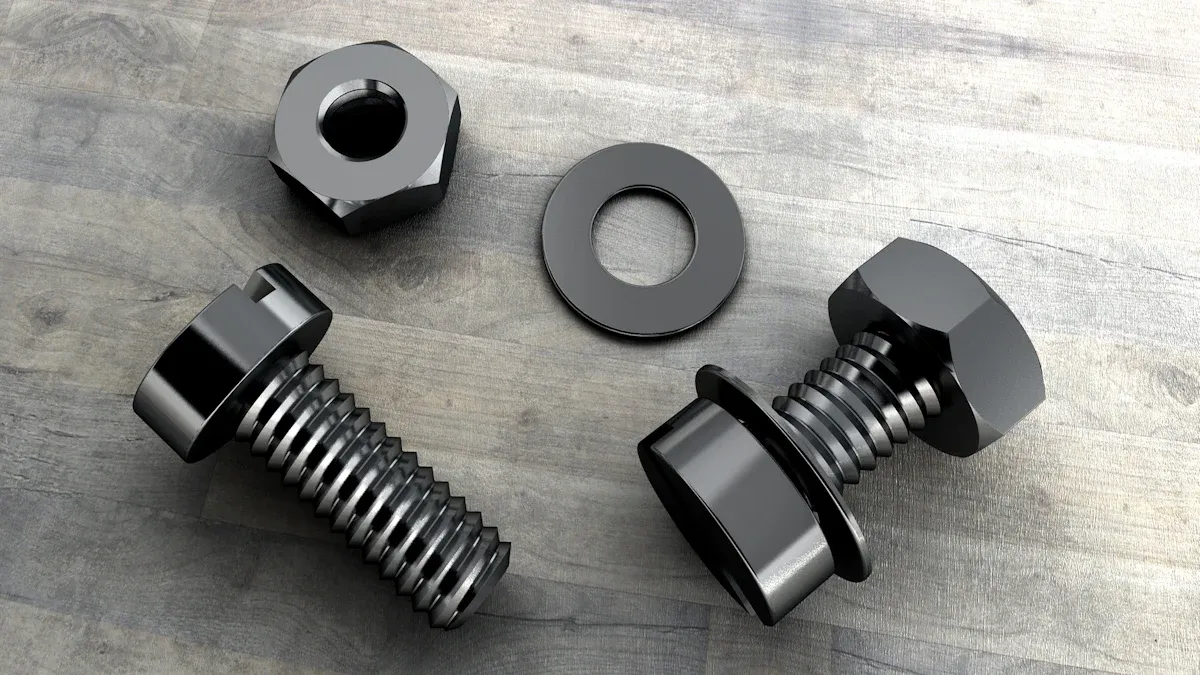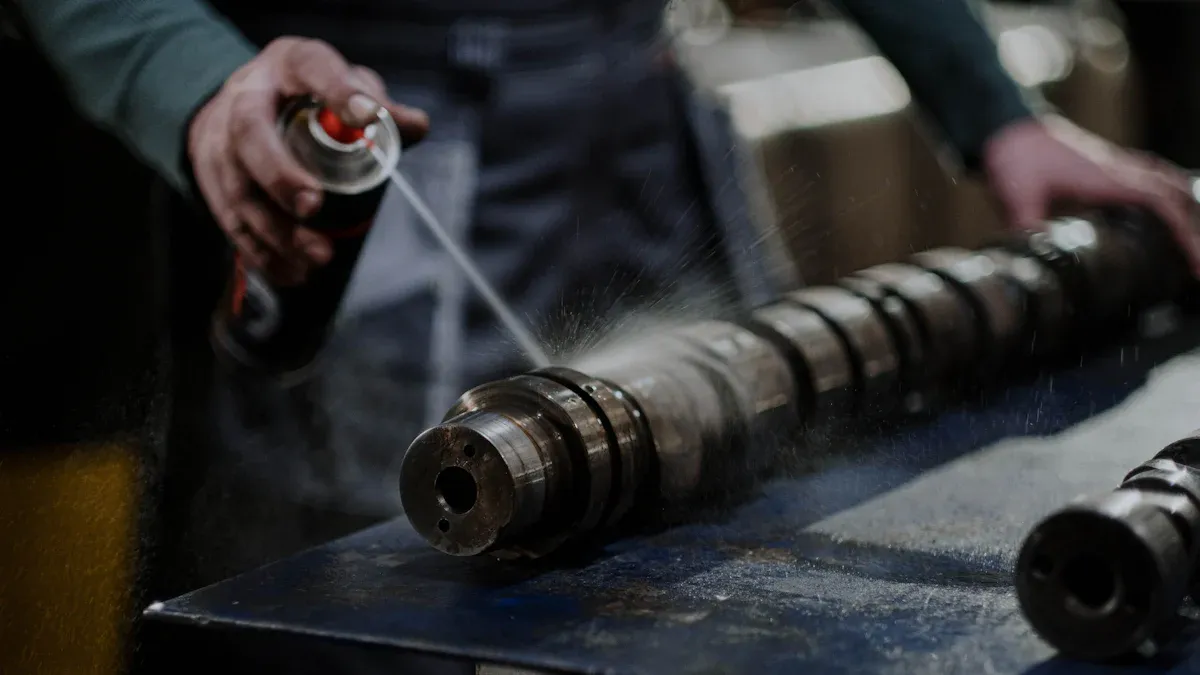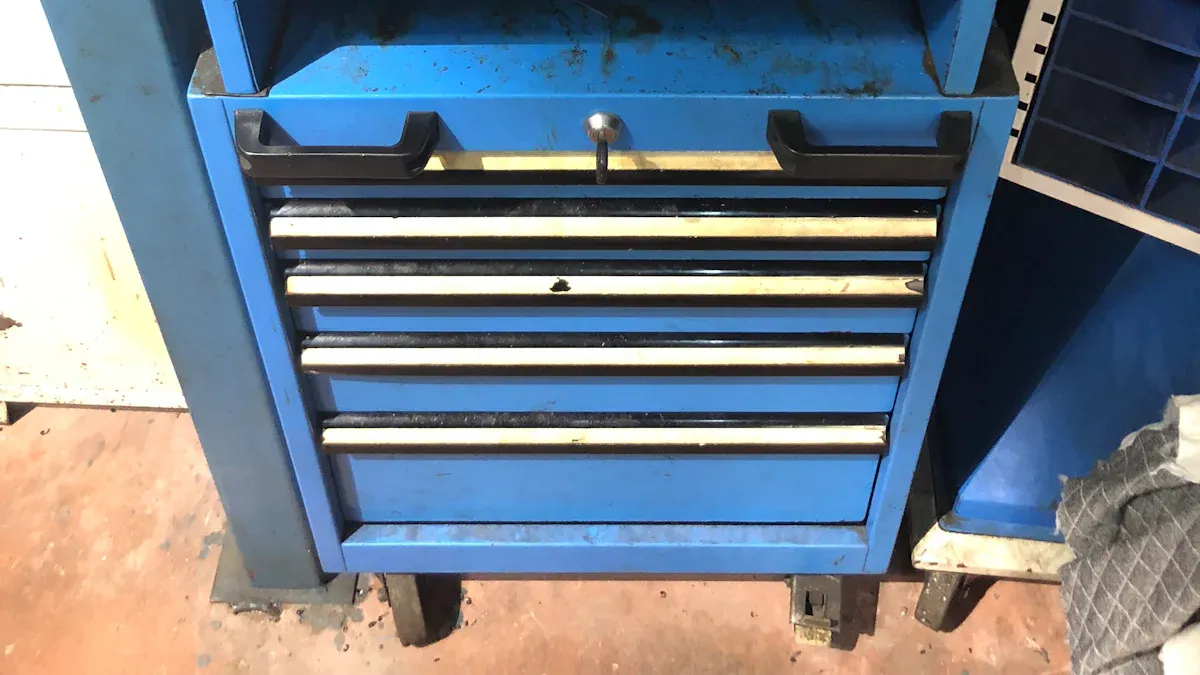Why CNC Precision Parts Are Crucial in the Automotive Manufacturing Sector

CNC precision parts have revolutionized the automotive manufacturing industry. These parts ensure the precision and repeatability required for safety-critical components like engines and gearboxes. CNC’s scalability supports both prototypes and mass production, enabling manufacturers to create reliable products efficiently. This innovation drives the automotive industry’s focus on performance and safety.
Key Takeaways
CNC machines make very accurate parts, with errors as small as ±0.001 inch. This is important for safety and how well car parts work.
CNC machines use automation to lower worker costs and save materials. This makes it cheaper to create both test parts and large amounts of car parts.
CNC tools help make new designs fast and allow changes easily. This helps car makers create new ideas and meet new needs quickly.
CNC Precision Machining in Automotive Manufacturing

What Is CNC Precision Machining?
CNC precision machining, short for Computer Numeric Control machining, is a manufacturing process that uses computerized systems to control machine tools. This technology enables the production of highly accurate and consistent parts by following pre-programmed instructions. Unlike traditional methods, CNC machining automates movements, reducing the need for manual intervention. It can perform multiple operations, such as cutting, drilling, and milling, with exceptional precision.
The precision machining process is essential for creating complex geometries that would be challenging or impossible to achieve manually. For example, CNC machining can produce tolerances as tight as ±0.001 inch, which is critical in industries like automotive manufacturing. This level of accuracy ensures that components fit perfectly and function reliably, even under extreme conditions.
Role of CNC in Automotive Manufacturing
CNC precision machining plays a vital role in the automotive industry by enabling the production of high-quality components. It is used to manufacture critical engine parts such as cylinder heads, crankshafts, and connecting rods. Interior components like dashboard panels and control interfaces also rely on CNC machining for their precise fit and finish. Exterior parts, including door panels and fenders, benefit from the same level of accuracy.
CNC machining ensures that engine components meet exact specifications, which is crucial for their durability and performance under high pressures and temperatures. This precision extends to other parts, ensuring they meet the required standards for safety and functionality.
CNC technology also supports rapid prototyping and customization, allowing manufacturers to innovate and adapt to changing demands. Unlike traditional methods, CNC machining minimizes human error and ensures repeatability, making it ideal for mass production. By automating processes, it enhances efficiency and reduces downtime, helping manufacturers deliver products faster and more cost-effectively.
Benefits of CNC Precision Parts in Automotive
Accuracy and Consistency
CNC machining ensures unparalleled accuracy and consistency in precision parts manufacturing. You can rely on CNC technology to produce components with tolerances as tight as ±0.001 inch. This level of precision is critical in the automotive industry, where even minor deviations can compromise safety and performance. CNC machines follow pre-programmed instructions, eliminating human error and ensuring every part meets exact specifications. This consistency is vital for creating high-quality automotive products that perform reliably under extreme conditions.
By using CNC machining, manufacturers can produce thousands of identical parts with consistent dimensions. This uniformity is essential for components like engine parts, where precise fits ensure durability and efficiency. Whether you're producing prototypes or scaling up for mass production, CNC machining guarantees the same level of accuracy every time.
Cost-Effectiveness and Scalability
CNC precision parts contribute significantly to cost savings and scalability in the manufacturing industry. Automating production reduces labor costs and minimizes material waste. CNC machining also ensures fewer defects, which translates to lower expenses for rework or replacements. These savings make CNC an ideal choice for high-quality precision parts manufacturing.
CNC technology excels in scalability. You can produce thousands of identical parts without compromising on quality or precision. This capability allows manufacturers to meet the growing demand for automotive components while maintaining cost efficiency. By optimizing material usage and reducing waste, CNC machining supports sustainable practices, further enhancing its value in the automotive sector.
Enhanced Efficiency and Speed
CNC machining enhances efficiency and speed in automotive production. The ability to create complex geometries and intricate designs reduces the need for manual intervention, minimizing errors and improving safety. CNC machines operate 24/7, enabling manufacturers to meet tight deadlines without sacrificing quality.
Automation in CNC machining optimizes workflows and minimizes downtime. This streamlined process improves productivity and reduces lead times, allowing you to deliver products faster. The precision and reliability of CNC technology ensure that every part meets the highest standards, contributing to the overall quality of automotive vehicles.
Applications of CNC Precision Parts in Automotive

Engine and Powertrain Components
CNC machining plays a critical role in producing engine and powertrain components with unmatched precision. You can rely on CNC technology to manufacture essential engine parts like crankshafts and valves, ensuring they meet tight tolerances for optimal performance. Transmission systems, including gears and gearboxes, also benefit from CNC machining's ability to create intricate designs that ensure seamless operation.
Other key applications include starter motors, where CNC machining prototypes parts to meet exacting durability standards. Drive axles, which must transmit power effectively, require robust and accurate machining. Electrical components, such as housings, also depend on CNC precision to ensure reliable operation. By using CNC milling and CNC turning, manufacturers achieve the high precision needed for these critical parts, enhancing both performance and durability.
Lightweight and Aerodynamic Parts
CNC machining supports the development of lightweight and aerodynamic automotive designs. You can use materials like aluminum, magnesium, and carbon fiber composites, which CNC machines handle with ease. Advanced programming allows for material removal in non-critical areas, reducing weight without compromising strength. This process not only improves fuel efficiency but also enhances vehicle performance.
Additionally, CNC machining enables the integration of multiple parts into a single lightweight component. This simplifies assembly and reduces overall weight. For example, custom CNC parts designed for aerodynamic efficiency can improve a vehicle's speed and stability. These innovations make CNC machining indispensable in modern automotive manufacturing.
Custom Prototypes and Innovative Designs
CNC machining excels in creating custom prototypes and innovative designs. You can quickly produce high-quality, functional prototypes, accelerating product development cycles. This capability allows you to experiment with intricate geometries and complex components, enhancing both functionality and aesthetics.
The ability to produce prototypes accurately reduces development costs and encourages innovation. Automotive designers often use CNC machining to create unique interior and exterior features, such as custom dashboard layouts and body panels. Custom suspension and drivetrain components, tailored for specific performance needs, are also made possible through CNC machining. These advancements highlight the importance of custom CNC parts in pushing the boundaries of automotive design.
Material Versatility and Quality Control in CNC Machining
Materials Used in Automotive CNC Parts
CNC machining offers unmatched versatility when it comes to material selection. You can choose from a wide range of materials, each tailored to meet specific requirements in the automotive sector. The table below highlights some of the most commonly used materials and their applications:
Material Type | Properties and Applications |
|---|---|
Aluminum Alloys | Lightweight, strong, excellent heat dissipation, corrosion resistance; used for engine blocks, cylinder heads. |
Cast Iron | Robust, excellent wear resistance; commonly found in engine blocks. |
Steel Alloys | High strength components like crankshafts; known for toughness and fatigue strength. |
Titanium Alloys | Exceptional strength-to-weight ratio; ideal for high-performance engine components. |
Copper Alloys | Excellent thermal conductivity; used in engine bearings and bushings. |
Plastics | Lightweight and flexible; used for dashboard components, interior parts, and battery casings. |
Composites | High strength-to-weight ratios; used in high-performance vehicles for parts like spoilers and frames. |
By leveraging these materials, you can achieve high tolerance levels and ensure that your automotive parts meet the demands of modern vehicles. CNC machining services allow you to work with these materials efficiently, ensuring precision and durability.
Quality Control for Reliability
Quality control plays a critical role in ensuring the reliability of CNC-machined parts. You can rely on advanced inspection techniques to verify that every component meets precise specifications. Tools like Coordinate Measuring Machines (CMM) measure dimensions with exceptional accuracy, ensuring that parts adhere to design requirements.
Real-time monitoring during the machining process further enhances quality. This in-process monitoring detects potential defects early, maintaining consistency throughout production. Here’s how quality control ensures reliability step by step:
Dimensional Inspection: Critical dimensions are measured to ensure adherence to design specifications.
Material Testing: Incoming materials undergo rigorous testing for strength and purity, ensuring suitability for automotive applications.
Process Monitoring: CNC machines monitor conditions in real-time, predicting and preventing defects before they occur.
Challenges like material variability and machine stability can impact quality. However, by selecting the right tools, cutting parameters, and coolants, you can overcome these obstacles. CNC machining services ensure that your parts meet the highest standards, delivering precision and reliability every time.
The Future of CNC Machining in Automotive
Automation and AI in CNC Machining
Automation and artificial intelligence (AI) are transforming CNC machining, making it more efficient and adaptable. AI systems enhance precision by reducing human error and enabling real-time monitoring of machining processes. For example, these systems can refine cutting paths and predict tool wear, ensuring consistent quality in every part produced. You can also benefit from predictive maintenance algorithms, which minimize downtime by addressing potential issues before they occur.
Digital twin technology is another groundbreaking innovation. It creates a virtual replica of the CNC machining process, allowing you to simulate and optimize operations before actual production begins. This approach not only saves time but also reduces material waste. Additionally, autonomous calibration adjustments and on-the-fly analytics streamline workflows, reducing the need for manual oversight. These advancements solidify CNC machining as a cornerstone of the automotive manufacturing industry.
Supporting Sustainability in Automotive Manufacturing
CNC machining plays a vital role in promoting sustainability within the automotive sector. By optimizing material use, CNC machines eliminate unnecessary waste during production. Advanced CAD/CAM software ensures precise material removal, allowing you to create lightweight parts without compromising strength. This efficiency supports the industry's shift toward using lightweight alloys and composites, which improve vehicle performance and fuel efficiency.
Energy-efficient machining processes further enhance sustainability. Automated systems reduce power consumption, while features like coolant recycling and reusable cutting tools lower the environmental footprint. Embracing circular economy principles, CNC machining also facilitates the use of recycled or biodegradable materials. These practices align with the automotive industry's commitment to sustainable production, ensuring that you can meet both environmental and performance goals.
CNC precision parts are the backbone of modern automotive manufacturing. They ensure high precision, unmatched repeatability, and the ability to produce complex geometries. These parts simplify production, enhance efficiency, and support innovation. As the industry evolves, CNC machining will continue to drive advancements in electric vehicles, autonomous systems, and sustainable practices.
FAQ
What makes CNC precision parts better than traditional manufacturing methods?
CNC precision parts offer unmatched accuracy and consistency. You can rely on them to produce complex designs with tight tolerances, reducing errors and ensuring superior quality compared to traditional methods.
Can CNC machining handle custom designs for automotive parts?
Yes, CNC machining excels at creating custom designs. You can quickly prototype intricate geometries and unique components, enabling innovation and faster product development in the automotive industry.
How does CNC machining contribute to sustainability in automotive manufacturing?
CNC machining minimizes material waste through precise cutting. You can also use recycled materials and energy-efficient processes, aligning with sustainability goals in modern automotive production.
See Also
Exploring CNC Precision Parts Processing Within Manufacturing Industry
Recognizing The Significance Of Precision CNC Machining In Production
Discovering CNC Machining Precision Applications In Aerospace Sector
Perfecting CNC Machining Techniques For Precision Parts Production
Streamlined CNC Machining Solutions For Accurate Manufacturing Needs
About US
Follow Us
Your prototype holds unparalleled significance, and we deeply value its uniqueness. Collaborating with you during the preparation phase for running your prototype or parts is a commitment we gladly embrace. Whether it's a single part or a complex assembly, we are dedicated to selecting the optimal tools and pathways to bring your envisioned product to life.
At Precision Fab CNC Machining, we specialize in producing parts for prototypes, short runs, and high-volume production. Our prototyping machine capabilities extend across metal, plastic, and wood machining, with welding fabrication services available to complement and finalize your prototype if required.
Address
Address: Room320 10F, Building A,Nanshan international building, Dayawan District, Huizhou, Guangdong, 516001 China
Contacts
billy@timaycnc.com

